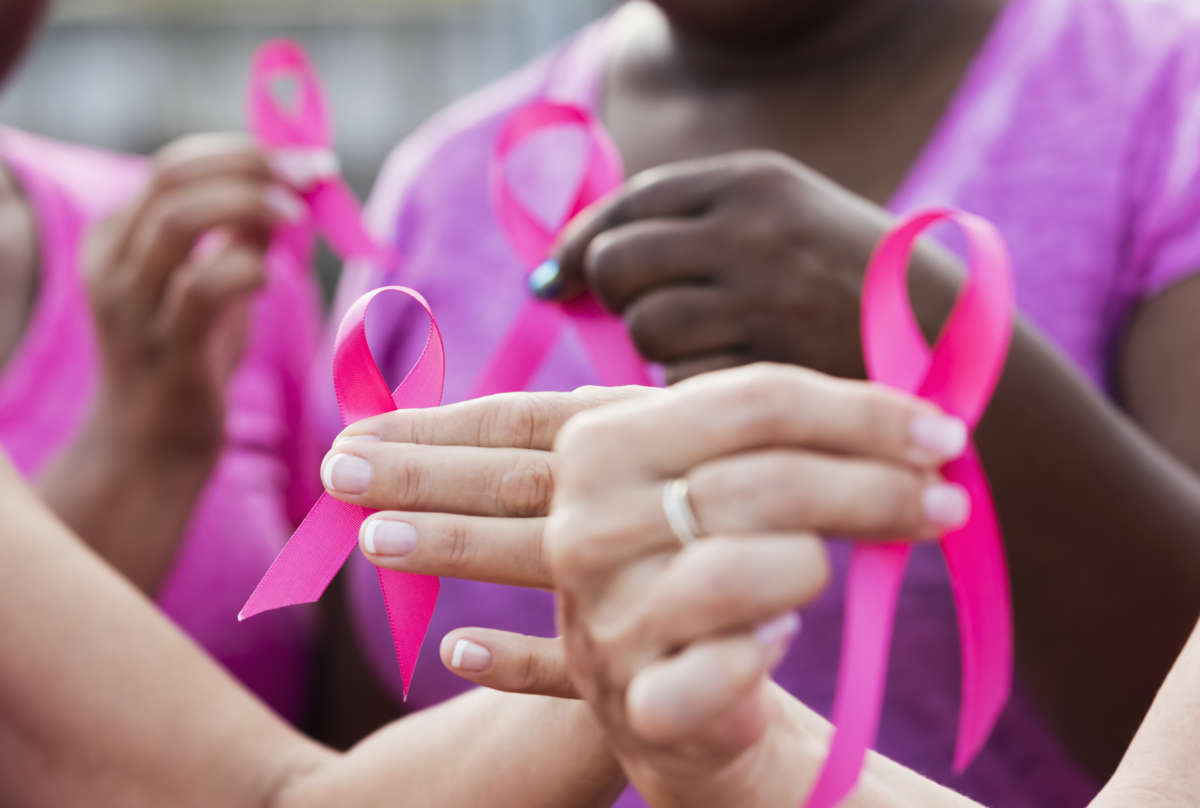October has come and gone, and despite promises to “raise awareness” by the hundreds of pink ribbon marketing campaigns that pop up during “Breast Cancer Industry Month,” it is estimated 43,000+ people will die from breast cancer in the U.S. this year alone. In fact, in 2021, breast cancer surpassed lung cancer to become the most commonly diagnosed cancer globally.
Though we are bombarded with pink ribbon promotions across our newsfeeds, our TV screens and in empty proclamations made by our legislators, breast cancer activists are not falling for it. Each year, more and more people debunk the pink ribbon promises they see in their targeted ads and turn a critical eye toward these profit-driven campaigns.
Yet one egregious pink ribbon promotion has escaped heavy scrutiny since its inception in 2009 — the Pink Ribbon Banking Program, a partnership between Susan G. Komen and Bank of America.
The banking program consists of a credit and debit card, and — you guessed it — the renowned pink ribbon graces the front of the card, suggesting a philanthropic intent with each of your purchases. Through the program, Bank of America has pledged to donate $1.5 million to Susan G. Komen between 2021 and 2023.
Just as this banking program has snuck under the radar and escaped the scrutiny faced by many other pink ribbon marketing partnerships, so too has Komen’s near-refusal to acknowledge the environmental causes of breast cancer.
Despite decades of studies resulting in a growing body of evidence definitively indicating there is a connection between environmental factors and breast cancer, Komen’s website dubiously classifies breast cancer and the environment as a risk factor “under study.” The limited information the organization does provide on breast cancer and the environment conveniently omits information on corporations contaminating our air, water, and bodies with chemicals linked to a range of diseases and disorders, including breast cancer.
One obvious reason for this omission is that many of the corporations responsible for toxic environmental exposures are some of Susan G. Komen’s biggest co-conspirators. In the case of the Pink Ribbon Banking Program, the large donation pledged by Bank of America, a major fossil fuel funder, results in a conflict of interest whereby Komen cannot acknowledge or act on the link between fossil fuel exposures and breast cancer.
The fossil fuel continuum exposes us to chemicals including benzene, polyaromatic hydrocarbons (PAHs), dioxins and per-and polyfluoroalkyl substances (PFAS) during extraction, processing, and the manufacture of fossil fuel products and byproducts, creating environmental exposures each linked to increased breast cancer risk. Bank of America has invested $42.1 billion in fossil fuels in 2020 alone, and the institution was one of the top three financial institutions to fund worldwide fossil fuel expansion between 2016 and 2020.
By accepting Bank of America’s donation — an arguably a small one given the institution’s financial prowess — and providing the feel-good marketing of the pink ribbon, Komen props up the fossil fuel industry, an industry that can cause the very disease the organization claims to want to end. By following the money, the path from the Pink Ribbon Banking Program to the proliferation of cancer-causing fossil fuels is laid bare, and the partnership is clearly pinkwashing.
Worse yet, while Komen has upped anti-racist talking points over the last year, environmental racism is inherent to the fossil fuel industry. Fossil fuel infrastructure disproportionately harms Black, Indigenous, people of color and low-income communities, and the construction of this infrastructure — including the Canadian oil giant Enbridge’s Line 3 Pipeline, also funded by Bank of America — results in the violation of numerous Indigenous treaty rights and human rights. Water Protectors are criminalized and subject to state-sanctioned violence, and Indigenous communities have reported increased rates of human trafficking and missing and murdered Indigenous women as the fossil fuel industry ravage their communities.
This is unacceptable. Fossil fuels are destroying our lands, poisoning our water, causing climate catastrophe, and increasing our risk for breast cancer, yet Komen has expressed pride in this partnership. After years of accepting funds from partners whose products have been linked to increased risk of breast cancer, it is safe to say that Susan G. Komen’s cause marketing program is toxic.
The organization has partnered with corporations including KFC, Ford Motor Company and another controversial fossil fuel profiteer fracking company Baker Hughes. Komen accepted $100,000 from Baker Hughes in 2014 after the oil giant produced 1,000 pink fracking drill bits, in an effort they claimed would “serve as a reminder of the importance of supporting research, treatment, screening, and education to help find the cures for this disease.”
We don’t need absurd pink drill bits or pink ribbon banking cards to address breast cancer. We need corporations — and especially leading breast cancer organizations like Susan G. Komen — to take decisive action to stop breast cancer before it starts.
Susan G. Komen is compromised. The organization has a legacy of continued, unabashed complicity in pink ribbon cancer-causing partnerships, and can start on the road to truly addressing breast cancer by ending the Pink Ribbon Banking Program. Komen must stop banking on breast cancer and divest from pinkwashing now.
Join us in defending the truth before it’s too late
The future of independent journalism is uncertain, and the consequences of losing it are too grave to ignore. To ensure Truthout remains safe, strong, and free, we need to raise $43,000 in the next 6 days. Every dollar raised goes directly toward the costs of producing news you can trust.
Please give what you can — because by supporting us with a tax-deductible donation, you’re not just preserving a source of news, you’re helping to safeguard what’s left of our democracy.
